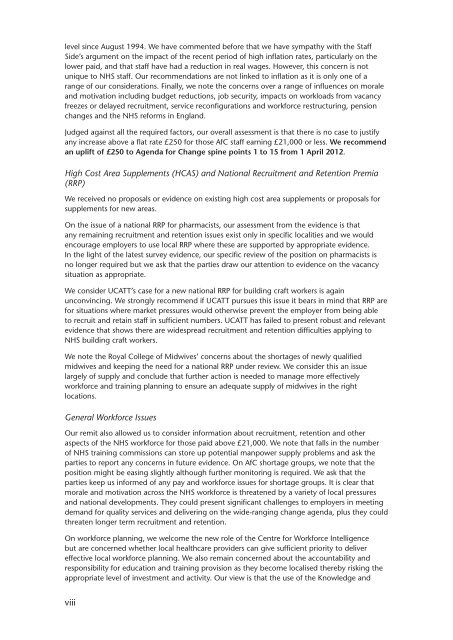NHS pay review body: twenty-sixth report 2012 - Official Documents
NHS pay review body: twenty-sixth report 2012 - Official Documents
NHS pay review body: twenty-sixth report 2012 - Official Documents
Create successful ePaper yourself
Turn your PDF publications into a flip-book with our unique Google optimized e-Paper software.
level since August 1994. We have commented before that we have sympathy with the Staff<br />
Side’s argument on the impact of the recent period of high inflation rates, particularly on the<br />
lower paid, and that staff have had a reduction in real wages. However, this concern is not<br />
unique to <strong>NHS</strong> staff. Our recommendations are not linked to inflation as it is only one of a<br />
range of our considerations. Finally, we note the concerns over a range of influences on morale<br />
and motivation including budget reductions, job security, impacts on workloads from vacancy<br />
freezes or delayed recruitment, service reconfigurations and workforce restructuring, pension<br />
changes and the <strong>NHS</strong> reforms in England.<br />
Judged against all the required factors, our overall assessment is that there is no case to justify<br />
any increase above a flat rate £250 for those AfC staff earning £21,000 or less. We recommend<br />
an uplift of £250 to Agenda for Change spine points 1 to 15 from 1 April <strong>2012</strong>.<br />
High Cost Area Supplements (HCAS) and National Recruitment and Retention Premia<br />
(RRP)<br />
We received no proposals or evidence on existing high cost area supplements or proposals for<br />
supplements for new areas.<br />
On the issue of a national RRP for pharmacists, our assessment from the evidence is that<br />
any remaining recruitment and retention issues exist only in specific localities and we would<br />
encourage employers to use local RRP where these are supported by appropriate evidence.<br />
In the light of the latest survey evidence, our specific <strong>review</strong> of the position on pharmacists is<br />
no longer required but we ask that the parties draw our attention to evidence on the vacancy<br />
situation as appropriate.<br />
We consider UCATT’s case for a new national RRP for building craft workers is again<br />
unconvincing. We strongly recommend if UCATT pursues this issue it bears in mind that RRP are<br />
for situations where market pressures would otherwise prevent the employer from being able<br />
to recruit and retain staff in sufficient numbers. UCATT has failed to present robust and relevant<br />
evidence that shows there are widespread recruitment and retention difficulties applying to<br />
<strong>NHS</strong> building craft workers.<br />
We note the Royal College of Midwives’ concerns about the shortages of newly qualified<br />
midwives and keeping the need for a national RRP under <strong>review</strong>. We consider this an issue<br />
largely of supply and conclude that further action is needed to manage more effectively<br />
workforce and training planning to ensure an adequate supply of midwives in the right<br />
locations.<br />
General Workforce Issues<br />
Our remit also allowed us to consider information about recruitment, retention and other<br />
aspects of the <strong>NHS</strong> workforce for those paid above £21,000. We note that falls in the number<br />
of <strong>NHS</strong> training commissions can store up potential manpower supply problems and ask the<br />
parties to <strong>report</strong> any concerns in future evidence. On AfC shortage groups, we note that the<br />
position might be easing slightly although further monitoring is required. We ask that the<br />
parties keep us informed of any <strong>pay</strong> and workforce issues for shortage groups. It is clear that<br />
morale and motivation across the <strong>NHS</strong> workforce is threatened by a variety of local pressures<br />
and national developments. They could present significant challenges to employers in meeting<br />
demand for quality services and delivering on the wide-ranging change agenda, plus they could<br />
threaten longer term recruitment and retention.<br />
On workforce planning, we welcome the new role of the Centre for Workforce Intelligence<br />
but are concerned whether local healthcare providers can give sufficient priority to deliver<br />
effective local workforce planning. We also remain concerned about the accountability and<br />
responsibility for education and training provision as they become localised thereby risking the<br />
appropriate level of investment and activity. Our view is that the use of the Knowledge and<br />
viii
















